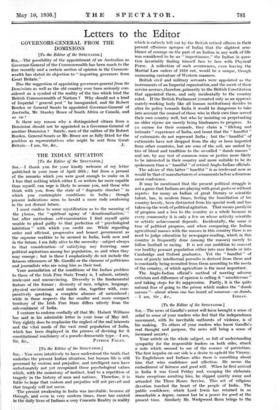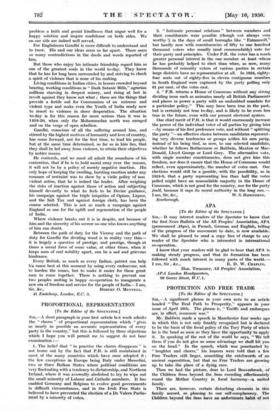[To the Editor of the SPECTATOR.] SIR,—The news of Gandhi's
arrest will have brought a sense of relief to some of your readers who feel that the independence movement, with its inevitable outbursts of violence, is of his making. To others of your readers who know Gandhi's real thought and purpose, the news will bring a sense of increased anxiety.
Your article on the whole subject, so full of understanding sympathy for the responsible leaders on both sides, struck a note which seemed to me of the essence of patriotism. The first impulse on our side is a desire to uphold the Viceroy. To Englishmen and Indians alike there is something about him that wins confidence and affection. He seems the embodiment of fairness and good will. When he first arrived in India it was Good Friday and, escaping the elaborate State receptions awaiting him, he slipped quietly away and attended the Three Hours Service. This act of religious devotion touched the heart of the people of India. The public confidence, which Lord Irwin has retained in so remarkable a degree, cannot but be a power for good at the present time. Similarly Mr. Wedgwood Berm brings to the
problem a faith and genial kindliness that augur well for a happy solution and inspire confidence on both sides. We on our side are indeed well served., .
For Englishmen Gandhi is more difficult to understand and to trust. His and our ideas seem so far apart. There seem so many contradictions in the deeds and words reported Of him.
But those who enjoy his intimate friendship regard him as one of the greatest souls in the world to-day. They know that he has for long been surrounded by and striving to check a spirit of violence that is none of his making.
Living conditions in Indian cities, in houses crowded beyond bearing, working conditions in " Dark Satanic Mills," agrarian millions starving in deepest misery, and rising at last in revolt against they know not what ; these are the things that provide a fertile soil for Communism of an extreme and
violent type and make even the Youth of India ready now to resort to violence in sheer desperation. The situation to-day is for this reason far more serious than it was in 1 919-20, when only the Mohammedan north waS enraged and on the verge of open rebellion.
Gandhi, conscichis of all the suffering around him, and• stirred by the highest motives of humanity and love of country,
has come forward, not for the first time, to lead his people, but at the same time determined, so far as in him lies, that they shall be led away from violence, to attain their objectives by nobler Means. ,
He Contends and we must all admit the soundness of his contention, that if he is to hold moral sv;ity Over the masses, it will not be by a. policy, of merely. negative inaction. His only hope of keeping the swelling, bursting emotion under any measure of -restraint Was to show by a virile policy of non violent action, that he is indeed the leader. After weighing the risks of inaction against tho,se of action and subjectiiig himself devoutly to what he feels to be Divine guidance, his campaign against the triple iniquities of Opiinn, Liquor, and the Salt Tax and against foreign Cloth, his been the course selected. This is not so much a campaign_ against England as one for the uplift and regeneration of the people of India.
Where violence breaks out it is in despite, not because of him and the sincerity of his sorrow no one who knows anything of him can doubt.
Between the path of duty for the Viceroy and the path of duty for Gandhi the dividing wood is in reality very thin—
it is largely a question of prestige, and prestige, though at times a moral force of some value, at other times, when it keeps men of real nobility apart, can be a sad and grievous hindrance.
Every British, as much as every Indian, patriot can help his cause best at this moment by using every endeavour, not to harden the issues, but to make it easier for these great men to come together. There is nothing to prevent our two peoples uniting in happy co-operation to inaugurate a new era of freedom and service for the people of India.-.-I am,
Sir, &c., ROBERT 0. MENNELL. 41 Eastcheap, London, E.C. 3.







































 Previous page
Previous page